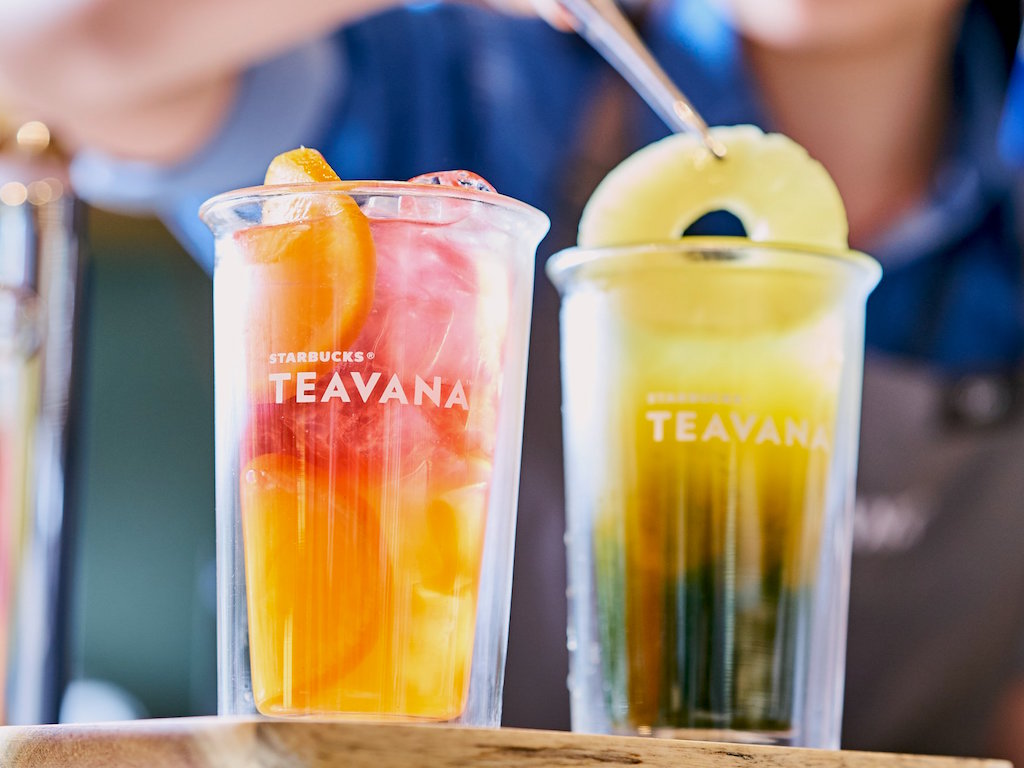3 Mins Read
Starbucks has recently launched Teavana-forward outlets in Hong Kong this summer, featuring open designs, botanical touches and brand new flavours. This comes alongside a number of green initiatives that the coffee-chain giant have also begun to push in the city, including a collaboration with collapsible mug company Stojo and ditching plastic items. Starbucks’ shift towards greener practices is reflective of a trend in responsible consumerism and increased awareness about health and wellness which has taken off in Asia.
After the initial debut of Teavana menu items three years ago, Starbucks is now opening two new locations of the brand, dubbed ‘Teavana Bar’ in Kwun Tong’s APM mall, as well as a Teavana Kiosk in Tsim Sha Tsui’s iSQUARE mall, both of which will also feature the brand’s full menu of coffee and other drinks. While the Kwun Tong location features an open interior, copper accents, plant themed fittings and 8 new tea concoctions, iSQUARE’s Teavana Kiosk will be a grab-and-go service.
Starbucks is innovating to accommodate Hong Kong and Asian consumers’ changing tastes for healthier, lighter and fresher options. One of the latest flavours offered by Teavana was borne out of an innovation challenge involving 60 mixologist partners earlier this year. The competition winner, Novan, created the bar’s drink Guava Youthberry Tea with Fig and Aloe. Other new beverages on Teavana’s menu also feature fruit-and-flower based ingredients such as include Lychee Earl Grey and the Peach Virgin Mojito.
Commenting on business strategies in Asia, Tom Birtwhistle from PwC Hong Kong told the SCMP that “retailers and restaurants – whether mass market or niche – need to constantly change winds as consumer trends shift.”
Hong Kongers are not just looking for healthier options, but greener ones too. Mintel’s latest report on consumer trends in the Asian Pacific region indicated that alongside a focus on wellbeing, people are increasingly aware about plastic pollution and want to see businesses taking plastic-free initiatives.
It is therefore unsurprising that Starbucks has unveiled a range of sustainable campaigns in the city this summer. In April, the chain introduced a pledge to reduce plastic waste by ditching plastic straws and stirrers for paper based ones, and launching a line of titanium straw sets in their retail section. They have also partnered up with reusable collapsible travel mug company Stojo to encourage customers to BYOC (Bring Your Own Cup).
But while these are positive steps for the environment, it is important to think about whether the chain is engaging in greenwashing, a case that many eco-activists have made. Indeed, there is nothing wrong with companies becoming more environmentally friendly in order to stay relevant to changing consumer tastes in sustainability, but they must also remain accountable to their claims. As Asian consumers become increasingly attuned to the health and wellbeing of their own bodies and the planet, we hope that more businesses respond and take genuine strides to make impactful change.
Aug 26 2019: This article was updated to correct standalone stores to Teavana-forward stores.
Lead image courtesy of Starbucks HK.




